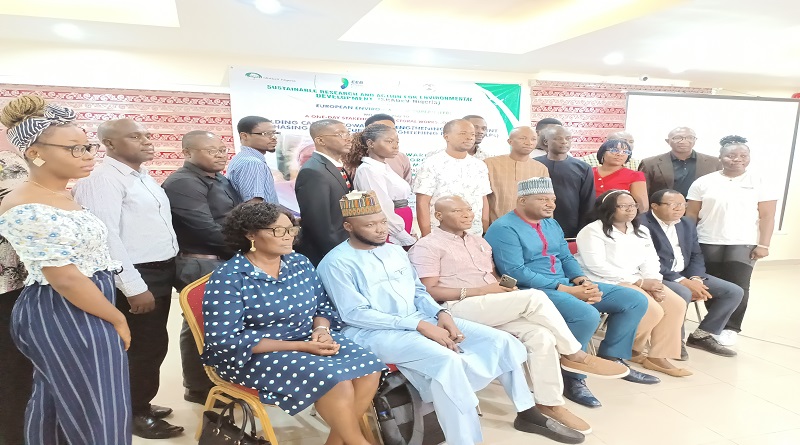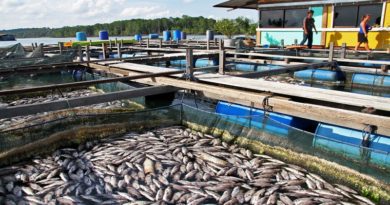Nigeria: Stakeholders decry proliferation of online platforms with mercury products
Photo caption: Group participants at the day-long awareness workshop organised by SRADev Nigeria held in Lagos on 12 December 2023.
Considering its negative implications on human health in general, concerned stakeholders have decried the latest proliferation of online trading platforms with mercury products, especially cosmetics.
Rising from a workshop organised by the Sustainable Research and Action for Environmental Development ( SRADev Nigeria) under the auspices of the European Environmental Bureau (EEB), in Lagos, the stakeholders considered strategies on the best approach to clean online platforms of mercury -laden cosmetics, skin lightening creams.
They expressed concern that despite the zero tolerance for mercury in the country, the chemical is still prevalent through the online sales of skin-lightening creams.
The stakeholders from the Federal Ministry of Environment, NAFDAC, Standards Organization of Nigeria, Customs Services, media, Federal Competition and Consumer Protection Commission and Lagos State Environmental Protection Agency , among others had converged on Lagos for one-day workshop held on Tuesday 12 December 2023 on awareness /capacity building to phase out strengthening enforcement to control illegal online sales.
The workshop’s aim was to create awareness for action among key stakeholders and strengthen the capacity of the Nigerian Government to better implement and enforce the provisions of the Minamata Convention on Mercury, particularly in skin-lightening products (SLPs).
The workshop also featured presentations and group discussions on various topics, including implementation of the Minamata Convention on mercury in Nigeria; online sales of mercury-containing skin-lightening creams: a global overview; and formal unveiling/launching of a video documentary.
Speaking, Executive Director, SRADeV Nigeria, Dr. Leslie Adogame, said the workshop centered on awareness campaign on skin lightening creams in Nigeria under the zero tolerance working group international.
Stating the dangers inherent in mercury products, he said the creams were being used to elevate the body texture -melanin, “but currently observed another way of colonialism where skin lightening cream has been impregnated with mercury.”
He continues,” Mercury is a very dangerous neurotoxicant, deadly chemical and that’s why the global communities have banned mercury use in products under the Minamata Convention on mercury.”
Even as mercury is banned in Nigeria, Adogame said it has been discovered that people have continued to use the chemical in skin lightening creams.
“When you add mercury into cream, it helps to take over the melanin component of the skin and exposes the skin.
“That’s why you see somebody who is naturally dark in colour will tend to clean it up with dangerous chemicals, destroying the melanin.
“Mercury penetrates the melanin into the blood tissue and people suffered from dangerous problems like reproductive health issue, neurological problem, still birth and so many. And it’s a major killer,” he said.
For these reasons, Adogame said the campaign is being escalated from global to local environments.
Despite the effort of NAFDAC, having taken regulation on zero tolerance on mercury since 2014, and having taken mercury off the shelves of supermarkets, the executive director of SRADeV said the products are now found through e- commerce online platforms such Jumia Jiji, Konga etc.
According to him, these online platforms were selling a lot of cosmetics laden with mercury.
“For the past five years, we have been sampling mercury online, buy and test. We found out that the story has changed. These companies continue to add mercury to creams and they came through online, and a lot of people don’t know, all in the name of wanting to look beautiful. Unsuspecting people are destroying their skin,” he said.
According to the executive director, a lot of research has shown that women who used lightening cream had deformed children.
To prevent devastated effect of mercury on human health, he said the message was being taken to everybody, including the regulatory agencies in regard to response to the subject matter.
“All the government institutions are here to ensure that mercury is a zero tolerant matter.
How to find a way to regulate the online platforms, which are usually faceless, he said was one of the reasons governments’ institutions were brought in to deliberate on possible solutions.
He called on appropriate authorities to make sure that e-commerce platforms are recognized and regulated.
Senior official from the Federal Ministry of Environment, Ahmed Bah Ibrahim, recalled that Nigeria is a party to Minamata Convention on mercury, and as a party, skin lightening cream came under Article 4 of the convention.
Based on the convention and suggestions from the Conference of Parties in Geneva 2023, he said that mercury product with 1ppm was banned.
In Africa, he said there was a declaration of zero tolerance for mercury products like cosmetics, adding that NAFDAC has toed the line.
From observations, he said a lot of the banned mercury products are now being sold through the online platforms.
According to him, time has come for all stakeholders to collaborate with NAFDAC to put a stop to online sales of mercury products.
Representative of Lagos State Environmental Protection Agency (LASEPA), Omotosho Olayinka, who doubles as the Director, Chemicals and Hazardous Materials Management, commended SRADev for its persistent campaign to phase out mercury products in Nigeria.
In Lagos State, he said it has become government’s policy to ensure that every facility dealing with chemicals obtained permit and ensure that it didn’t endanger the health of residents.
He urged government’s regulatory agencies in collaboration with NAFDAC to ensure that all access to dangerous chemicals in the country are blocked.
A representative of NAFDAC, who did not want his name in print said that any online mercury’s cosmetic products trending in the country were faked products by definition of the law of the country.
He commented SRADeV for taken the campaign up by uncovering social media platforms’ excesses.




